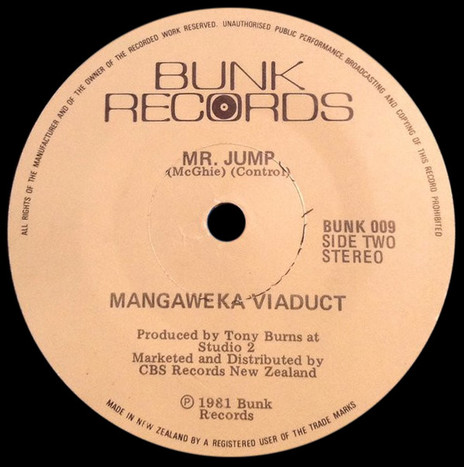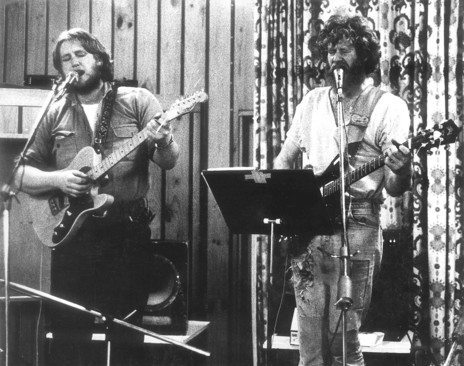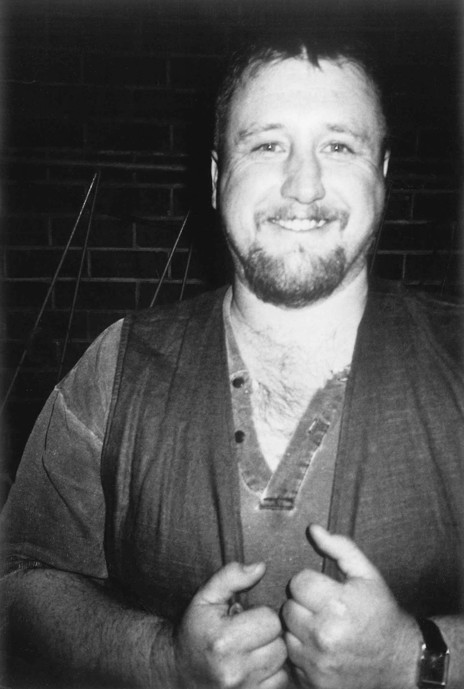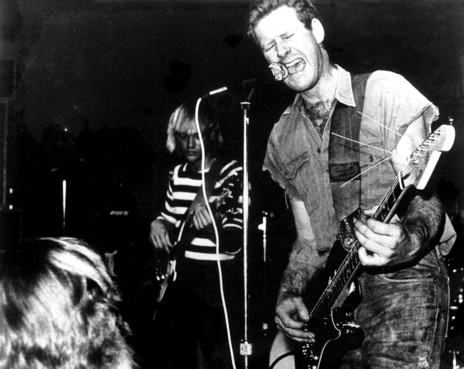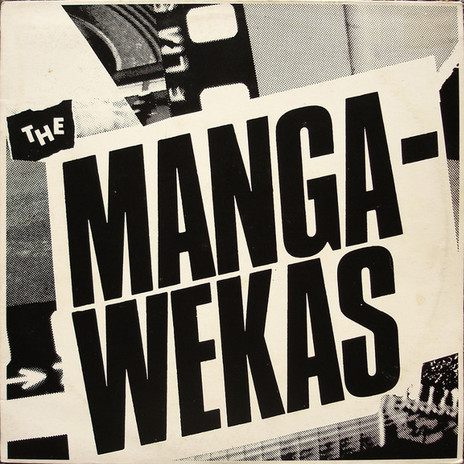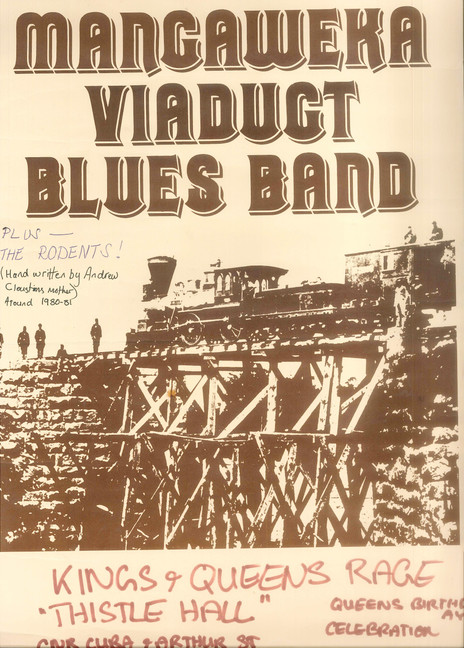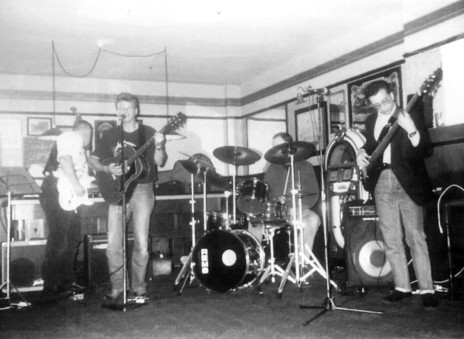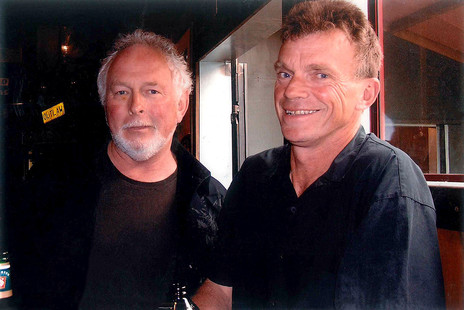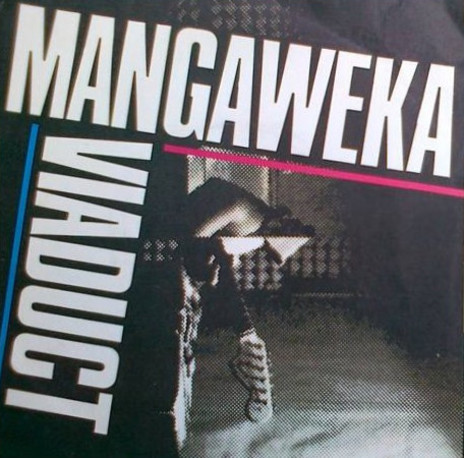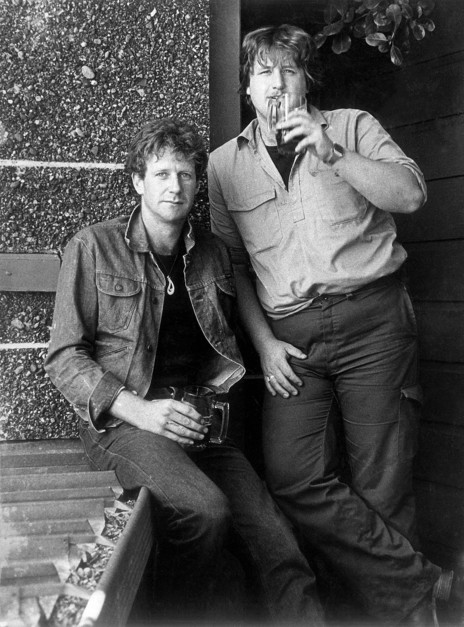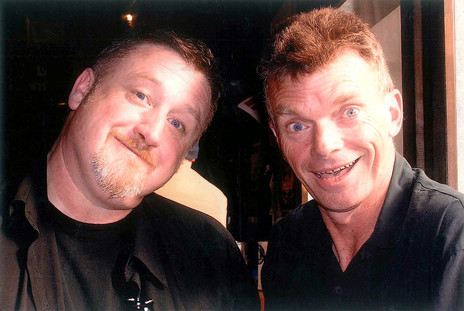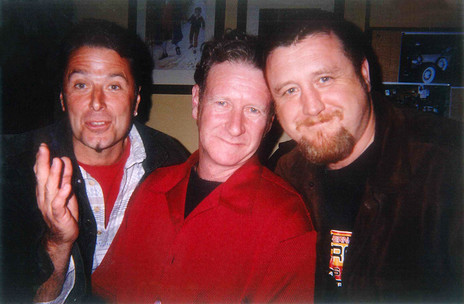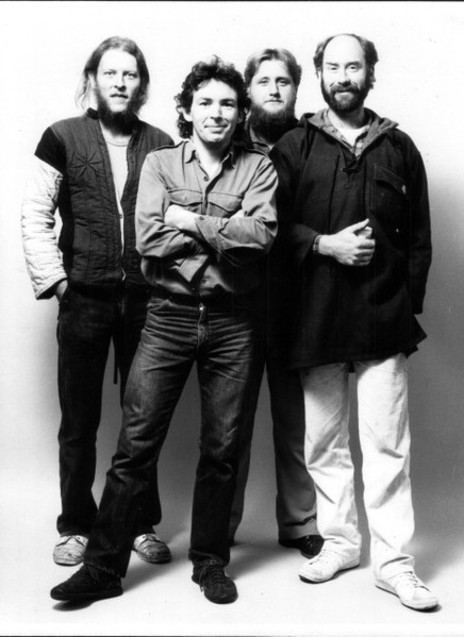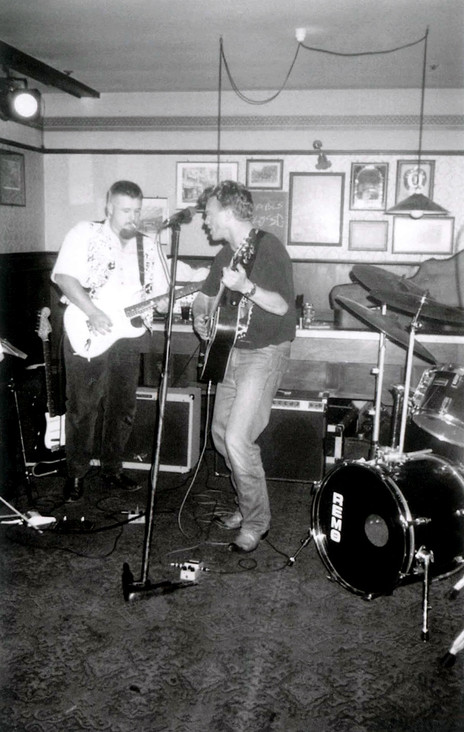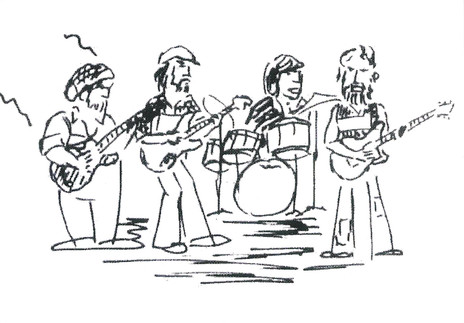The name? It was inspired not by geography, but by Jack’s flatmate, Terry Apperley, who had a cat called Mangaweka. Terry became the band’s de facto good buddy, roadie, fixer, and general assistant.They threw in “Viaduct” for good measure. It sounded cool, and that was good enough.
They weren’t the first guitar players of note from the Hutt Valley. In the 1960s, a teenage Chaz Burke-Kennedy tore it up with Lower Hutt’s The Roadrunners, a gritty R&B outfit easily on par with British and American acts of the day. Martin Hope – from Upper Hutt’s The Fourmyula – wasn’t far behind.
In the 70s, a new name emerged. Bruce Speir – or “Dougal” as he would later be known – was finding his feet in a Christian acoustic folk group called Ubiquity, performing on the Youth for Christ (YFC) circuits.
Inspired by his older brother Colin (of The Moving Folk, and Maranatha), Dougal took a deep dive into bluegrass and UK folk – eg, John Renbourn, Bert Jansch – learning mostly by ear. His one guitar “lesson” taught him three chords and how to play ‘Guitar Boogie’. From there, he was off and running, soon realising that his nylon-stringed guitar wasn’t quite cut out for the sounds in his head.
Ubiquity lasted five years and even toured nationally with YFC. It was a revelation to the teenage Speir, who discovered that life on the road, even for Christian bands, included access to beer and adventure.
As Ubiquity wound down and married life and fatherhood took over, Dougal continued playing. He reunited musically with childhood friend Jack Lloyd-Jones, and together they frequented Wellington folk venues such as the famed Monde Marie in Mt Victoria. Dougal occasionally backed blues vocalist Marg Layton there, but the blues itch needed a lot more scratching.
over pints at the Rimutaka pub, the Mangaweka Viaduct Blues Band was born
And so, over pints at the Rimutaka pub, the Mangaweka Viaduct Blues Band was born. The early lineup featured Warren “Skin” Heenan on drums and a bassist from Wainui. Over time, the lineup changes included drummers Steve Garden, Tim Robinson and Danny Shaw, and bassists Richard Barter and Davie McGee.
Lloyd-Jones’s growing interest in ska nudged the band in new directions, but their signature twin-guitar attack – fuelled by Dougal’s Roy Buchanan-inspired harmonics, Hendrix flourishes and JJ Cale cool – remained.
The Mangawekas played wherever the beer was cold or available and the crowd was wild. In Wellington, Victoria University’s Rock Against Racism gigs, the Cricketers’ Arms, the Clyde Quay Tavern, as well as pubs up and down the country. In 1981, they landed a slot at the massive Nambassa Festival alongside The Charlie Daniels Band, Midnight Oil, Kevin Borich Express, and Sonny Terry & Brownie McGhee.
One surreal chapter unfolded at a private gig in Plimmerton, the peaceful seaside village just north of Wellington. The party was classic – stoned surfers, cruisy hippie vibes, and the scent of ’erb in the air – until the infamous police Red Squad suddenly stormed in, batons flailing. Hippies hit the ground in confusion, the band was lined up against a wall, and the place was torn apart. No one really knew why. The band, of course, never got paid. Just another night on the road.
Later, Radio New Zealand invited the Mangawekas to lay down a few tracks at their cutting-edge Studio 2 on Bowen Street; the session included the late pianist John Key. Soon after, Bones left the group and Dougal stepped up as frontman. With Martin Wilson and John “Timberjack” Donoghue onboard, they shortened the name to The Mangawekas and carried on as a high-energy pub band. Their final bow was at 1990’s chaotic Sesqui celebration in Wellington – another gig where no one got paid.
Once heard, Dougal’s playing left an impression. Wild and unorthodox, inventive, raw and never boring. Always a generous and approachable chap despite his sometimes imposing appearance, people still approach him to this day to reminisce about long-forgotten gigs, to show him worn-out copies of the band’s lone album, or to thank him for a solo that blew their mind in 1982.
Posters for a band called Free Beer caused predictable chaos
After the Mangawekas ended, Timberjack invited Dougal to join Johnny and The Skyhawks. They played The Oaks in Wellington and packed out the Portage near Nelson for three wild New Year’s Eve shows; then the intensity got too much for Donoghue. A cheeky follow-up band called Free Beer didn’t last either. Posters reading “Free Beer tonight at ---- Hotel” caused predictable chaos.
Next came The Norman Brothers, quickly renamed The Slides, featuring a rotating cast of top-tier players including John O’Connor (Redeye), Jimmy Lawrie (Highway, Street Talk, Pink Flamingos), the late George Limbidis (Highway). Wellington bluesman Dave Murphy joined soon after and, before long, The Fabulous Gout Brothers emerged. It was a return to blues roots, with Dougal, Murphy, drummer Dave Head, and the unpredictable AK Goss on face piano and contortions.
That band evolved into The Red Dog Saloon Band, a mainstay of the Wellington blues scene for over 30 years. Murphy’s fingerpicking finesse pairs perfectly with Dougal’s fiery Stratocaster and Telecaster explorations-soaring solos, “squealy bits” and all. Initial members included Elliotte Fuimaono on bass, and drummers Richard Te One and Maurice Phillips.
In 1996, Dougal and bluesman Pip Payne – a recent arrival from London – co-founded Capital Blues Inc, a cornerstone of Wellington’s music scene ever since, giving blues artists a regular stage and cementing the city’s reputation as a home of the blues.
Dougal’s side projects over the years have included gigs with Sonny Day, Billy TK, and Al Hunter, as well as outfits like Kayte and the Barflies, The Bruce Brothers, The Kemptones (his epic guitar battles with the late, great Kemp Tuirirangi are legendary), and The Crying Shame (the Red Dogs but with Prof. Warwick Murray aka “Shirley” on electric “blukulele”, vocals and guitar).
Dougal always preferred “feel” over polish – and somehow, it worked
For the last 20 years, The Red Dogs’ regular lineup has been Dougal, Dave Murphy, Elliot Fuimaono, and myself on drums, with regular guest appearances by harmonica wizard Neil Billington, trombonist Damian Forlong, and – for away gigs or when Elliot is unavailable – long-time collaborator and mate, bassist Paul du Fresne. Surprises are common. Rehearsals? Not so much. Dougal always preferred “feel” over polish – and somehow, it works. A lot of the time, we ride the edge of chaos and still manage to come out grinning.
Although dealing with health issues in the 2020s, Dougal continued to astonish audiences with his fearless, inventive playing. Whether it’s ‘Little Wing’, ‘Red House’, ‘Talk To Your Daughter’, ‘Dust My Broom’ – or a spontaneous jam that teeters on madness – he finds new ways to wring emotion and fire from his beloved Strat or Tele. His solos are less about precision, more about expression. When the crowd is into it, and the band is cooking, he can lift the whole room.
For over three decades, The Red Dog Saloon Band has played festivals, pubs, biker bars, house parties and everything in between. As Doogs says, if it’s still fun, why slow down or stop? Right, now where’s that beer …
--
Dougal Speir died on 28 October 2025.
